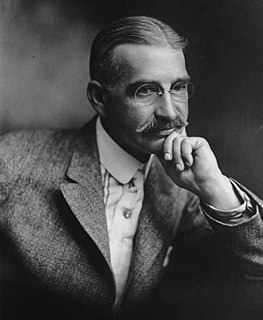A Quote by Marcus Aurelius
When we consider we are bound to be serviceable to mankind, and bear with their faults, we shall perceive there is a common tie of nature and relation between us.
Related Quotes
Believing that I was born for the service of mankind, and regarding the care of the commonwealth as a kind of common property which, like the air and the water, belongs to everybody, I set myself to consider in what way mankind might be best served, and what service I was myself best fitted by nature to perform.
No adversity is in kind or degree peculiar to us; but if we survey the conditions of other men (of our brethren everywhere, of our neighbours all about us), and compare our case with theirs, we shall find that we have many consorts and associates in adversity, most as ill, many far worse bestead than ourselves; whence it must be a great fondness and perverseness to be displeased that we are not exempted from, but exposed to bear a share in the common troubles and burdens of mankind.
Religion, therefore, as I now ask you arbitrarily to take it, shall mean for us the feelings, acts, and experiences of individual men in their solitude, so far as they apprehend themselves to stand in relation to whatever they may consider the divine. Since the relation may be either moral, physical, or ritual, it is evident that out of religion in the sense in which we take it, theologies, philosophies, and ecclesiastical organizations may secondarily grow.
Let us turn our thoughts today to Martin Luther King and recognize that there are ties between us, all men and women living on the Earth. Ties of hope and love, sister and brotherhood, that we are bound together in our desire to see the world become a place in which our children can grow free and strong. We are bound together by the task that stands before us and the road that lies ahead. We are bound and we are bound.
Poverty is not a certain small amount of goods, nor is it just a relation between means and ends; above all it is a relation between people. Poverty is a social status. As such it is the invention of civilization. Socrates made the same point 2,400 years ago: "He is richest who is content with least, for contentment is the wealth of nature.
I trust in Nature for the stable laws Of beauty and utility. Spring shall plant And Autumn garner to the end of time. I trust in God,-the right shall be the right And other than the wrong, while he endures. I trust in my own soul, that can perceive The outward and the inward,-Nature's good And God's.
The Triumph of Wit is to make your good Nature subdue your Censure; to be quick in seeing Faults, and slow in exposing them. You are to consider, that the invisible thing called a Good Name, is made up of the Breath of Numbers that speak well of you; so that if by a disobliging Word you silence the meanest, the Gale will be less strong which is to bear up your Esteem.








































